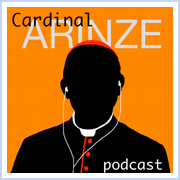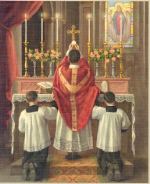"The Lord thy God shalt thou worship and him only shalt thou serve." (St. Matthew, 4:10)
Some years back, the Newman Club of a midwestern state college was holding its regular discussion in the Student Union building. The topic was the Blessed Sacrament. After the chaplain had briefly explained the Catholic teaching, one of the non-Catholics present politely but firmly raised the objection: "Father, the Catholic teaching has no basis or parallel in science, has it? As far as we know, substance always remains the same. In other words, bread always remains bread, and wine always remains wine. They can't be changed into something different."
"Did you ever study chemistry?" the priest asked.
"I made a stab at it," admitted the student.
"Well," Father went on, "even if you never studied chemistry, you know that the food and drink you take is changed into flesh and bone and blood. Does the bread you eat and the wine you drink stay the same? Not at all. They are changed-into flesh and blood. That change is worked through your body which God created. If God can work a change indirectly through your body, He can work the same change directly and without any human means. He is all-powerful. God works such a change at the consecration of the Mass."
The student admitted that he had never thought of that.
Keep that comparison in mind as we consider the Holy Eucharist, the sacrament of the true Body and Blood of Christ, together with His Soul and Divinity, under the appearances of bread and wine. Eucharist means thanksgiving. In giving us the Eucharist Christ gave fitting thanks to His heavenly Father. By celebrating the Eucharist we also give fit thanks to God for all His benefits. It is called "Holy" because it contains the very Author of holiness, and because it makes us holy.
The Eucharist has the three things needed for a sacrament: An outward sign, inward grace, and institution by Christ.
In the Blessed Sacrament we see, feel and taste bread and wine, the outward sign, the matter, the "stuff," as it were, from which the sacrament is made. Note how fitting:
1. Bread is a universal food; wine, a universal drink. They nourish the body. Holy Eucharist feeds the soul.
2. Bread and wine are changed into our flesh and blood. Communion changes us into the likeness of Christ.
3. Bread and wine express love, a union of hearts. Bread comes from the union of many grains of wheat. Wine is made from the union of many drops of the juice of the grape.
4. To make bread one must grind the grains of wheat. To make wine one must crush the grapes. What an apt figure of the passion when Jesus was ground and crushed for us.
5. The form of this sacrament are the words: This is My body; This is My blood.
The second mark of a sacrament is grace. In the Eucharist bread is changed into the flesh of the very Author of grace, the flesh that was formed in the pure womb of Mary, the flesh that healed all who touched it, the flesh that was crushed in the passion, the flesh that hung on the cruel cross, the flesh now gloriously reigning in heaven.
In the Eucharist wine is changed into the blood of Christ, the blood that is one with His sacred body, the blood that was taken from the virginal veins of His mother, the blood poured out for us in the passion, the blood that is all-powerful, one drop of which will wash away all the sins of the world.
In the Eucharist we also have the soul of the Son of God, the soul that lived on this earth, the soul now glorious in heaven, the soul, beautiful and perfect, that went out to the sick and suffering, that ached with the thoughtlessness of men, that was wrung with grief in the agony, the soul that rejoiced the redeemed in Limbo, the soul that rose victoriously.
Here in the Eucharist God is present, the God who worked miracles, the God who suffered and died for us, the God who rose for us, the God who reigns in heaven and here upon His altar throne.
Only a God could have thought of coming to us and staying with us under the appearances of bread and wine, multiplying His presence all over the earth for all time. Think of it - flour and water and the juice of the grape are the means God uses to stay with us and come to us.
In the fourth cahpter of St. Matthew's gospel, we see the devil tempting our Lord to turn stones into bread. With a mere wish Jesus could have done that. He was God. As God, He could change bread and wine into His body and blood. And He did.
The devil tempted Christ to throw Himself down from the top of the temple. Would not the angels hold him up? Instead, Jesus chose to throw Himself upon the care and love of His people in every place where the Eucharist is kept.
All the kingdoms and glory of the world were offered to Christ, if He would fall down and adore the evil one. Jesus refused, knowing that kings and kingdoms, peoples and nations would fall down in real adoration of Him in the world-wide love of the Eucharist.
Yes, Christ we will worship, Christ we will serve, Christ we will love in the adorable, loving sacrament of His presence right here on earth in our tabernacles and upon our altars.
Adapted from Prayer, Precepts, and Virtues
by Fr. Arthur Tonne, 1949









